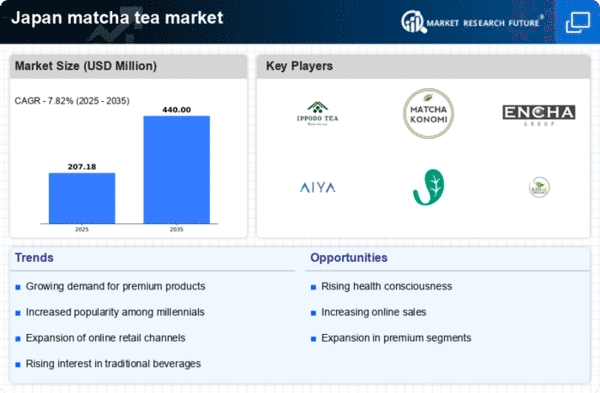The Japan Matcha Tea Market is characterized by a rich tapestry of competitive dynamics driven by rising consumer interest in health and wellness products, along with the growing popularity of traditional and specialty teas. Matcha, known for its vibrant green color and distinctive flavor profile, has gained significant traction among consumers seeking premium beverage options and natural alternatives to coffee and other caffeinated drinks. In this landscape, diverse players are vying for market share, emphasizing product quality, authenticity, and innovative distribution strategies.
The leading companies in this market are investing heavily in branding and marketing efforts while focusing on sustainability and ethical sourcing practices to appeal to an increasingly discerning consumer base. As more consumers become knowledgeable about the benefits of matcha, including its antioxidant properties and potential health benefits, the market is poised for continued growth and diversification.In the context of the Japan Matcha Tea Market, Rooibos Tea stands out with a powerful presence, promoting the complementary benefits of its herbal teas alongside matcha offerings.
Known for its naturally caffeine-free profile, Rooibos Tea has carved out a niche that attracts consumers interested in holistic and healthy living. The brand leverages its unique selling proposition by emphasizing the health benefits associated with rooibos tea, which are often seen as synergistic with matcha's attributes. The company's strengths lie in its commitment to high-quality ingredients, extensive product range, and effective marketing campaigns highlighting wellness and natural lifestyles.
By maintaining a robust supply chain and engaging with health-focused communities, Rooibos Tea continues to reinforce its position in the market, appealing to those who appreciate both traditional Japanese matcha and complementary herbal options.DoMatcha has established itself as a prominent player within the Japan Matcha Tea Market, focusing on authenticity and premium quality in its product offerings. The brand offers a variety of matcha-related products, including ceremonial matcha, culinary matcha, and ready-to-drink options that resonate with different consumer segments.
DoMatcha prides itself on its meticulous sourcing processes, ensuring that its matcha is harvested from established tea farms in Japan known for their traditional cultivation methods. Strengths of DoMatcha include a strong brand reputation built around quality and tradition, along with a commitment to educating consumers about the cultural significance and health advantages of matcha consumption. The company has also explored opportunities for expansion through strategic partnerships and collaborations, which enhance its distribution capabilities and market presence, further solidifying its position in the competitive landscape of Japan's matcha tea market.









